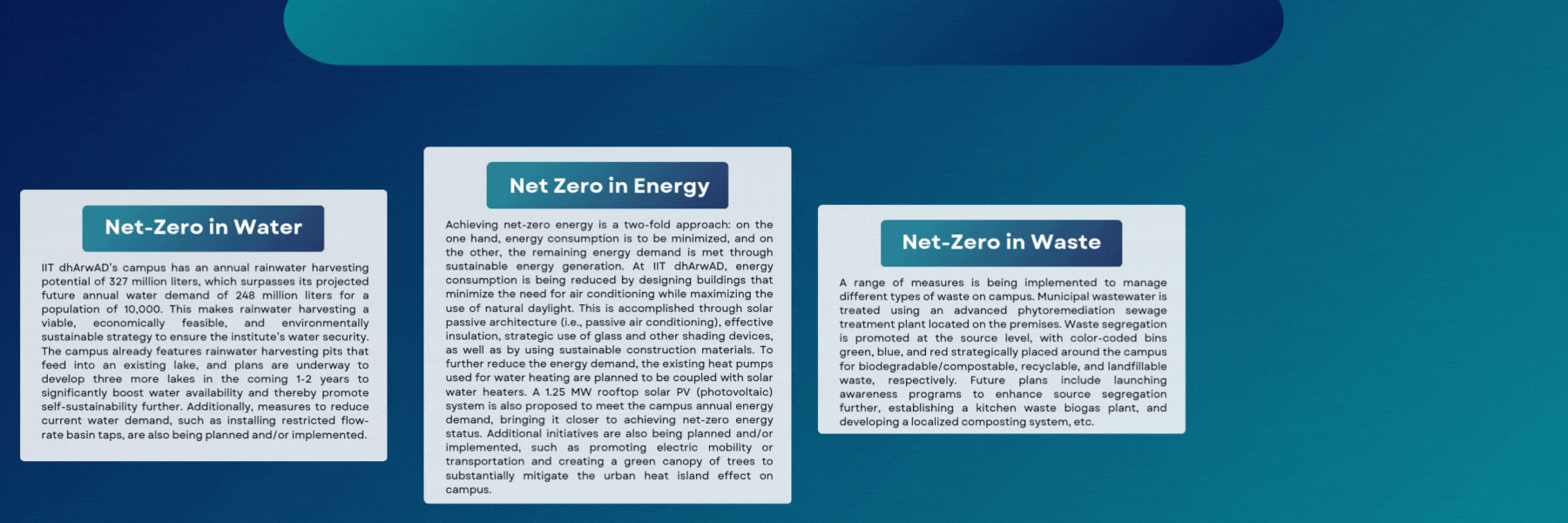
IIT dhArwAD is committed to create an Academic Campus having net zero in water, energy, and waste by 2030, as mandated by its Board of Governors (BoG). Significant strides have already been made, with several initiatives in progress, to transform the institute’s 470-acre campus into a model of self-sustainability. The institute’s commitment is reflected in its achievements, such as earning a 5-star rating under GRIHA (Green Rating for Integrated Habitat Assessment) for the Large Development Master Plan in December 2022, establishing a state-of-the-art phytoremediation sewage treatment plant, etc. Further measures are being planned and adopted for achieving a net zero status in water, energy, and waste through actions which are outlined below:
Net-Zero in Water: IIT dhArwAD’s campus has an annual rainwater harvesting potential of 327 million liters, which surpasses its projected future annual water demand of 248 million liters for a population of 10,000. This makes rainwater harvesting a viable, economically feasible, and environmentally sustainable strategy to ensure the institute’s water security. The campus already features rainwater harvesting pits that feed into an existing lake, and plans are underway to develop three more lakes in the coming 1-2 years to significantly boost water availability and thereby promote self-sustainability further. Additionally, measures to reduce current water demand, such as installing restricted flow-rate basin taps, are also being planned and/or implemented.
Net Zero in Energy: Achieving net-zero energy is a two-fold approach: on the one hand, energy consumption is to be minimized, and on the other, the remaining energy demand is met through sustainable energy generation. At IIT dhArwAD, energy consumption is being reduced by designing buildings that minimize the need for air conditioning while maximizing the use of natural daylight. This is accomplished through solar passive architecture (i.e., passive air conditioning), effective insulation, strategic use of glass and other shading devices, as well as by using sustainable construction materials. To further reduce the energy demand, the existing heat pumps used for water heating are planned to be coupled with solar water heaters. A 1.25 MW rooftop solar PV (photovoltaic) system is also proposed to meet the campus annual energy demand, bringing it closer to achieving net-zero energy status. Additional initiatives are also being planned and/or implemented, such as promoting electric mobility or transportation and creating a green canopy of trees to substantially mitigate the urban heat island effect on campus.
Net-Zero in Waste: A range of measures is being implemented to manage different types of waste on campus. Municipal wastewater is treated using an advanced phytoremediation sewage treatment plant located on the premises. Waste segregation is promoted at the source level, with color-coded bins green, blue, and red strategically placed around the campus for biodegradable/compostable, recyclable, and landfillable waste, respectively. Future plans include launching awareness programs to enhance source segregation further, establishing a kitchen waste biogas plant, and developing a localized composting system, etc.
 myIIT
myIIT
